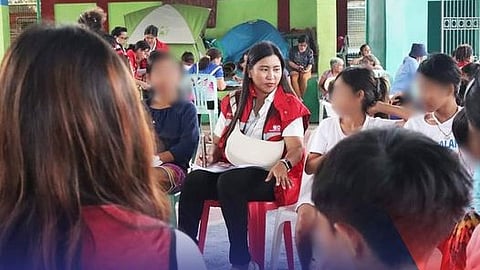
- NEWS
- the EDIT
- COMMENTARY
- BUSINESS
- LIFE
- SHOW
- ACTION
- GLOBAL GOALS
- SNAPS
- DYARYO TIRADA
- MORE

The Department of Social Welfare and Development (DSWD), as the leader of the Philippine delegation at the first Global Ministerial Conference (GMC) on Ending Violence Against Children (VAC), committed to adopting a whole-of-nation approach to eliminate VAC.
“The Philippines is dedicated to establishing a more robust child protection system within its legal and policy frameworks, with particular emphasis on improving government coordination structures,” said DSWD Assistant Secretary for International Affairs, Attached and Supervised Agencies (IAASA), Atty. Elaine Fallarcuna, during her speech at the global conference held in Bogotá, Colombia on 8 November.
Regarding the response and support services for children, the Philippine government pledged to institutionalize multidisciplinary teams in all cities, municipalities, and public hospitals across the country by 2030.
“Each multidisciplinary team will consist of doctors, police officers, social workers, lawyers and other professionals, who will respond to and manage cases of violence against children using a trauma-informed approach,” Fallarcuna explained on behalf of the Philippine government.
In the area of foster care and adoption services, the Philippine government committed to increasing the number of foster parents to at least 10 per child-placing agencies in municipalities, cities and provinces.
By 2030, the Philippine government also pledged to expedite domestic adoption processes by ensuring that adoption petitions are processed within nine months of filing, according to Fallarcuna.
Furthermore, the Philippine government vowed to strengthen the rights of children to participate meaningfully, particularly child victim-survivors, by mandating their inclusion in the drafting, implementation, and evaluation of policies at both national and local levels.
On the issue of human, financial and infrastructure resources, Fallarcuna stated, “The Philippines commits to allocating at least 3 percent of the general fund to child protection programs, particularly through a dedicated line item, which will be monitored across sectors and supported by annual budget increases from 2024 to 2030. This will ensure that resources for child protection are properly identified, accounted for, and protected from being diverted.”
The Philippine government also committed to developing a comprehensive child protection strategy with a more robust mechanism, particularly focusing on educational institutions. This will include the development of child protection specialists and the strengthening of national and local legislation and executive actions.
Recognizing the financial stress that parents face, Fallarcuna highlighted that the Philippine government will provide support to parents and caregivers through economic strengthening programs and evidence-based parenting sessions. These initiatives will help educate parents and caregivers on replacing corporal punishment with non-violent discipline methods.
Finally, the Philippine government pledged to contribute to creating a safer digital environment for children by developing a strategic plan to combat Online Sexual Abuse and Exploitation of Children and Child Sexual Abuse and Exploitation Materials. This plan is set to be implemented in 2025.
